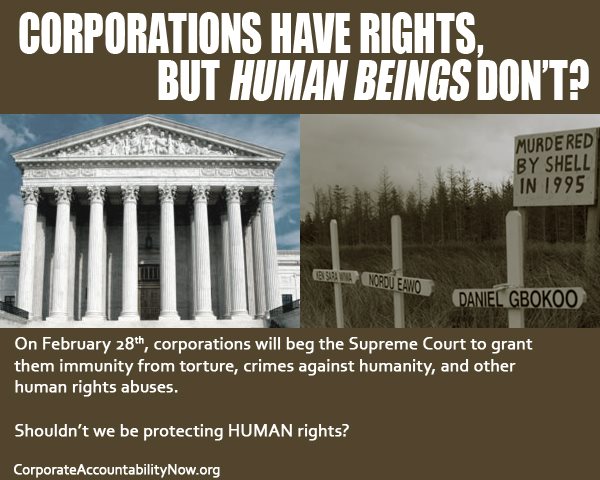Any time I discuss corporate “personhood” in this post, please assume there are quotes around personhood. The idea is patently absurd, and any time I seem to tacitly accept the idea it’s only for argument’s sake.
Let’s say a corporation was convicted of a crime: Would it have to serve jail time? The notion that corporations should be jailable obviously makes no sense, but that only underscores the absurdity of the Supreme Court claiming in its Citizens United decision that corporations are people.

Of course, the Supreme Court made that argument in its twisted attempt to justify re-classifying money as free speech. The ultra-conservative Roberts court was pursuing its ideological, capitalist agenda, seeking to give their corporate pals as much power as possible. But now the Supreme Court is considering a case that tests how far the conservative justices are willing to go to defend the “corporations are people” ideology.
In the case before the Supreme Court, Kiobel v. Royal Dutch Petroleum, the question is whether or not people who have been subjected to human rights abuses aided and abetted by an international corporation can sue that corporation for damages. The plaintiffs in the case are Nigerians who suffered horrendous acts of abuse — torture, arbitrary detention, killings of family members — under a military dictatorship in the mid-1990s. They sued Royal Dutch Petroleum, better known as Shell Oil, for its alleged complicity in those crimes against humanity.
The stakes couldn’t be higher. As EarthRights International executive director Ka Hsaw Wa writes in the LA Times: “The justices will consider whether the U.S. will become a haven for companies that are allegedly complicit in the most heinous crimes or whether it will continue to provide a legal forum for accountability and justice.” (His whole piece is a great background on the case and the larger issue of corporate accountability for human rights violations, it’s very much worth giving the whole thing a read.)
Marco Simons, legal director of EarthRights International, wrote on CNN of the implications this case has for the future of corporate personhood:
The Supreme Court has already decided that these legal persons [corporations], which would not even exist if state laws did not allow for incorporation, have equivalent constitutional rights to natural persons. The Citizens United decision in 2010, allowing unlimited corporate expenditures to influence elections, demonstrates that the Court has no hesitation to call corporations “people” when it benefits corporate interests.
But calling corporations “people” should also benefit the victims of corporate wrongdoing. The appeals court in the Kiobel case thought otherwise; it ruled that corporations, and corporate profits, could not be reached by victims of human rights abuses. Despite having constitutional rights, corporations simply aren’t subject to human rights law, according to this court.
Want to sell poison gas to the Nazis? No problem, your profits are safe. Want to traffic child prostitutes into the U.S.? Form a corporation, and even if you go to jail, the proceeds of your crimes can’t be reached by your victims… Organize a genocide, hold slaves — as long as it’s done in the corporate name, the Kiobel ruling would prevent the victims from seeking any remedy.
The Supreme Court has an opportunity to correct this error and to make it clear that corporations must accept responsibilities along with the rights that they’re granted.
According to the Huffington Post’s Supreme Court correspondent, the court’s 5-judge conservative majority seems poised to rule against the plaintiffs and deny their right to seek redress from Shell. A decision isn’t expected until June.
There really is something surreal about this whole conversation, in my opinion. It’s like we’re all living in some Orwellian dystopia, a world that would make a good setting for a movie directed by Terry Gilliam. But it’s all too real: We live in a world where the NYT runs op-eds with the title “Should Corporations Have More Leeway to Kill Than People Do?” That this is an all-too serious question that the highest court in our land is considering should give us all pause. That the Supreme Court might actually rule that corporations are only “people” when it’s beneficial to them but not when it comes to being held accountable for unspeakable crimes should anger everyone.